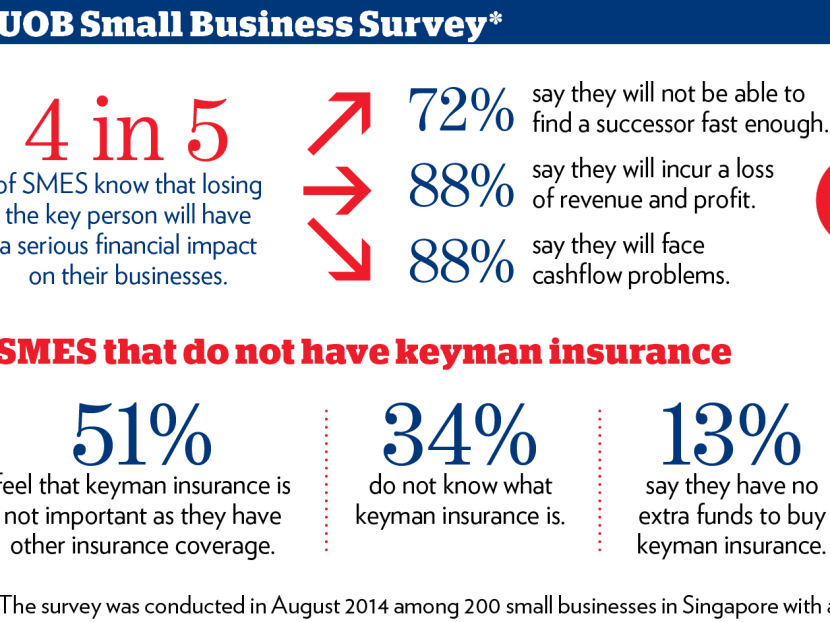The key to business continuity
For most small and medium enterprises (SMEs), market expansion and funding for future growth are typically their top priorities rather than protecting their business by managing risks.

For most small and medium enterprises (SMEs), market expansion and funding for future growth are typically their top priorities rather than protecting their business by managing risks.
According to the UOB Small Business Survey*, one in two SMEs is at risk of not being adequately insured against the loss of their key person. With the loss of the key person, the SME may be faced with revenue loss and insufficient cashflow.
Mr Samuel Leung, UOB’s head of bancassurance, shares why keyman insurance can ensure the continuity of the business.
Why is protecting the key person important to an SME?
Mr Leung: An SME often relies on an individual or a small number of people to keep the company going. A sudden loss of any key person could pose a significant financial impact on the company. Employee morale and the confidence levels of business partners could also be adversely affected.
In addition, SMEs often use the personal assets of their key person as security for a bank loan. This means that the risk can extend to personal assets and affect the financial health of the key person’s family. Keyman insurance helps to manage these risks and ensures the company has sufficient funds to keep the business going in the short term before a successor is found.
Who would qualify as key persons in an SME?
Mr Leung: The key persons of an SME are the chief executive officer, sales directors, project specialists, the chief financial officer and the operations head. Professional partnerships like doctors, dentists and accountants also need to be protected — each partner is the key person of the business.
What is the difference between keyman insurance and personal life insurance?
Mr Leung: The proceeds of keyman insurance go to the company. Keyman insurance protects the company’s financial interest and ensures its survivorship. It injects cashflow into the company and enhances its liquidity position. Also, the insurance premium for keyman insurance may qualify for tax relief if it fits the conditions set by the Inland Revenue Authority of Singapore.
The proceeds of personal life insurance go to the life insured’s immediate family or estate. In Singapore, any death proceeds of a personal life insurance can only be claimed fully after a long probate process (if no nomination is made). However, the entire proceeds of keyman insurance can be used immediately upon the occurrence of the insurance event to meet the company’s liquidity requirements.
Why is personal life insurance inadequate for SMEs?
Mr Leung: Some SME owners consider personal insurance as keyman insurance. But this leaves the company unprotected and exposes liabilities such as outstanding business loans.
Some believe that they have their collaterals with the creditor, so loan protection on the key person is not needed. They may be over-confident that the value of the collaterals can be realised at the best price when the insurance event happens.
Some also underestimate the financial impact of the loss of the key person. The cashflow in the business cycle may change and as a result, the business might have liquidity issues, leading to forced selling and even more financial losses.
What can UOB’s keyman insurance offer SMEs?
Mr Leung: Our business insurance specialists will advise on the appropriate plan for the company based on its financing needs and cashflow position.
UOB has launched a keyman insurance called UOB BizMoney Guard, where business owners can enjoy a guaranteed issued protection of the key person. This is offered as a complimentary insurance to UOB clients who have an unsecured term loan under the UOB BizMoney programme^. It is the first keyman insurance plan in Singapore that does not require the key person to go through financial and medical screening.
UOB BizMoney Guard is designed to ensure a company’s cashflow remains unaffected by the loss of its key person. For instance, the insurance can be used to cover the company’s operating expenses until a successor is found and, if necessary, to pay off the company’s debt so that its financial health remains strong.
*The survey was conducted in August 2014 among 200 small businesses in Singapore with an annual turnover of up to S$20 million.
^For full terms and conditions, visit uob.com.sg/bizmoney.
Produced by the TODAY Special Projects Team





